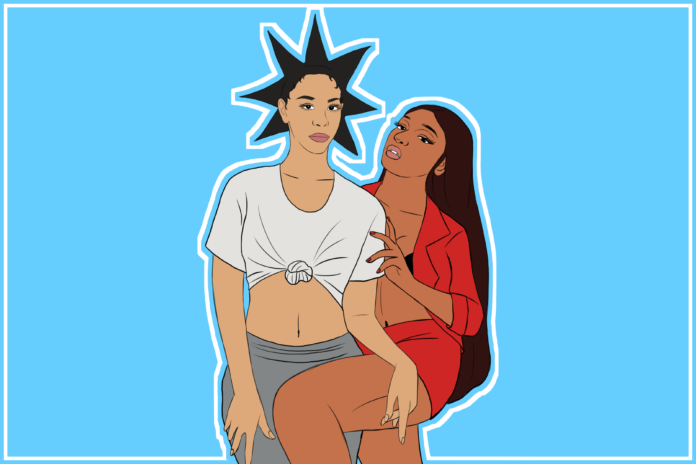With fresh stories and perspectives, female rappers are elevating hip-hop higher than ever before
We’re lucky enough to be living in a period that, despite the COVID-19 pandemic, is musically rich and diverse. Excluding the frequent tone-deaf decisions made by the Recording Academy, the world is fully embracing the hip-hop genre and its many faces.
Hip-hop and its contemporaries are based on the business of storytelling. These stories aim to highlight different individual experiences: from childhood memories to fortune and fame.
Female rappers have distinct voices and unique stories to tell. The ways in which female rappers continue to direct the hip-hop narrative to stories of womanhood and feminism is instrumental in furthering the genre as a whole.
“Not Tonight” is a ’90s collaboration that celebrated unity among female rappers and is where Missy Elliot, Lil’ Kim, Da Brat and other influential female rap figures celebrated spending time with their squads during ladies’ night. Elliot tells listeners they “should be like Missy ‘stead of being like Mike,” referencing the infatuation with Michael Jordan.
At the same time, however, there have been moments where hip-hop feminist rhetoric has faltered. Ignoring these moments would undercut the work done to progress feminism in hip-hop.
Ms. Lauryn Hill is one of the most popular hip-hop artists. “The Miseducation of Lauryn Hill” became the first rap album to win Album of the Year at the Grammy Awards. She was the trailblazer for female hip-hop artists at the turn of the millennium.
For all of her amazing achievements, Ms. Hill used the formerly prominent trope of “giving it up” (with “it” being one’s body or sex) on “Doo Wop (That Thing).” On the classic track, Ms. Hill remarks on how women “give it up so easy” and let men “hit it.”
Some argue that these phrases were nothing more than colloquialisms for sexual activities, but they are actually steeped in internalized misogyny. It perpetuates the idea that sex is a one-way street: Women are giving and men are taking. Despite this criticism, Ms. Hill is consistently lauded for her feminist appeal and rightly so. “Doo Wop (That Thing)” as a whole is a very empowering song with some pertinent messages throughout: “Don’t be a hard rock when you really are a gem!”
Feminism in hip-hop isn’t perfect or concrete. What is? The movement is constantly growing and evolving. The same thing goes for the music industry — trends ebb and flow to mesh uniformly with current culture. To fully discuss the aspects of hip-hop feminism is to understand the nature of the movement as it changes through history.
Due to the cyclical nature of musical trends and fame, the hype surrounding Lil’ Kim and Missy Elliot eventually dropped, leaving a gaping hole in the hip-hop scene where mainstream female rappers previously reigned. Nicki Minaj’s 2010 album “Pink Friday,” and especially her hit single “Super Bass,” managed to make up for this tragic disparity. Hip-hop found its next shining star.
Minaj’s indisputable talent — evident in her showing up Kanye West on his own song — and infectious energy catapulted her past one-hit wonder status from the success of “Super Bass.”
In grade school, I was struck by how Minaj was so uniquely herself. Minaj famously voiced her opinion in a documentary clip, now known as the “pickle juice” clip. Here, Minaj demands more for herself as a female artist and addresses double standards in the rap game. She was one of the earliest female figures to do so for my generation, which is somewhere between millenial and zoomer.
Lil’ Kim, Missy Elliot and Minaj alike paved the way for today’s artists to create mega cultural phenomena like Megan thee Stallion’s “Hot Girl Summer” (a moment of silence for Hot Girl Summer 2020). Before this, women had to pick between two lifestyles: “nine to five or shaking that ass.” Now we can have both. Our culture allows women to be simultaneously college-educated, independent and sex-positive — or just some (or none) of these things.
This isn’t just a win for feminism. It’s a win for hip-hop. In a genre where women were often disparaged or barred from inclusion, putting female rappers like Megan thee Stallion, Noname, Rico Nasty and City Girls at the forefront of today’s hip-hop is a critical step to creating a more multifaceted genre. The feminine experience is finally being included.
People argue that hip-hop doesn’t have to change, and that’s simply not true. Society is progressing, and it would be a disservice to the artists and the genre if hip-hop didn’t follow suit.
Written by: Isabella Chuecos –– ifchuecos@ucdavis.edu
Disclaimer: The views and opinions expressed by individual columnists belong to the columnists alone and do not necessarily indicate the views and opinions held by The California Aggie





